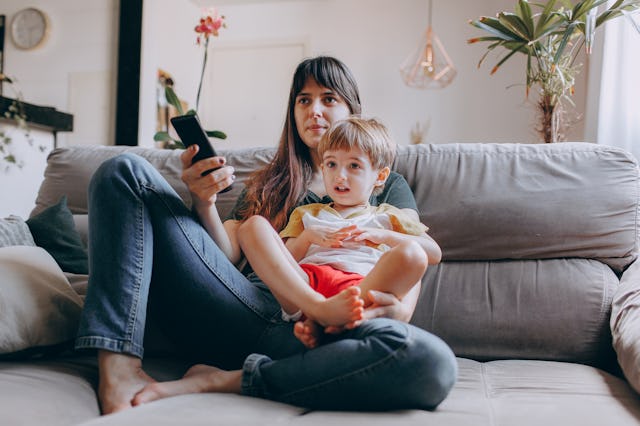Does Your Kid Hate Watching Movies? This Might Be Why
Family movie night in disarray? Don't fret, Mama.

For many families, nights spent curled up on the couch together watching a flick can often feel like a fun respite from the day-to-day chaos of school, work, activities, and, well, everything.
Maybe you look forward to introducing your kid to your favorite childhood classics, or perhaps your crew loves checking out the latest and greatest streaming options. All seems well until suddenly your little one refuses to watch movies… or they’re only interested in watching something they’ve already seen dozens of times.
Clinical psychologist Dr. Becky recently summed up this head-scratching behavior on TikTok, explaining to her followers why kids might avoid watching new movies or any movies altogether.
“Do you have a kid who refuses to watch movies?” she asks the camera. “They hate movies unless they’ve seen it 100 times already. Or maybe they’ll watch a movie that seems so ‘babyish’ for their age.”
In the clip, Dr. Becky shares that one of her kids is like this, noting that it’s a “very common tendency among deeply feeling kids.”
She explains that deeply feeling kids are more “porous” to the world, feeling things more intensely and, in turn, preferring to feel “more in control” whenever possible.
“A movie is a situation where something might happen that surprises you,” she says. “Something might happen that scares you. Something might happen on that screen that all of a sudden overwhelms you.” Therefore, avoiding tuning in feels like a protective measure, even when it might seem strange or frustrating for parents and caregivers.
Why does this happen?
Turns out, it’s totally common and can even impact adults, too. (Hi, it’s me, avoiding so many “sad” movies in my queue because the prospect of feeling too much feels totally overwhelming.)
“Big feelers can struggle with all kinds of media, not just movies,” as Kristin and Deena, the moms behind Big Little Feelings, tell Scary Mommy. “The emotional content, sensory intensity, or even the unpredictability of a new book, TV show, or game can feel overwhelming. It’s all about how they process the world, which is with big feelings and lots of awareness.”
How do you know if your kid falls into this category, anyway? “Deeply feeling kids tend to be highly empathetic, noticing and absorbing emotions around them,” the pair notes. “They often have strong reactions to sensory input like loud noises or bright lights and may need extra time to process changes or new experiences. These traits can show up very early — even as infants — with behaviors like being more aware of their surroundings or crying more when overstimulated.”
“Big feelers go from 0 to 100 real fast,” they add. “They’re often the kid screaming at the birthday party because the loud music, bright lights, and overwhelming emotions of the day hit them all at once. Their feelings are big, loud, and intense because they’re more porous to the world around them. This means they absorb everything — sounds, sights, emotions — like a sponge. While this makes their reactions seem ‘extra,’ it also means they experience the beauty of the world more deeply than most.”
How can this be handled?
If this is your kid, Kristin and Deena recommend normalizing their feelings without criticizing, mocking, or making a big deal out of it. “You might say, ‘You know, some people really love watching new movies, and some people feel better sticking to ones they already know. Everyone is different, and that’s totally OK!’ By taking the pressure off, you’re helping them feel accepted and safe to share their feelings about it,” they say.
As for how to handle it, trust your gut. “You can respect their preferences while also gently encouraging them,” they add. “For example, watch a new movie together and reassure them, ‘If it feels like too much, we can pause or stop anytime.’ The goal is to help them feel in control and supported, not pushed. If they’re not ready, that’s OK too — comfort movies can be their safe place for now.”
The TL;DR here: “For many big feeling kids, this is just who they are,” the duo says. “The more you embrace, support, and work with them, the more they thrive. And, of course, if you’re seeing signs of anxiety, intense fear, or have any other concerns, don’t hesitate to reach out to your pediatrician or a child therapist for support.”
Thankfully, there’s no shortage of calming kids movies out there with more chill vibes (no jump scares or big emotional subplots here!) in case your kid is open to trying something new in time. No shame in skipping movie night altogether, either. Your kid’s comfort and safety is more important than whatever’s coming out on the big or small screen these days.